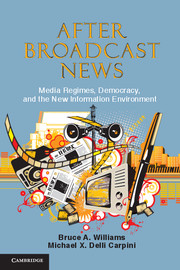Book contents
- Frontmatter
- Contents
- Acknowledgments
- 1 Is There a Difference Between Tina Fey and Katie Couric? Policing the Boundaries Between News and Entertainment
- 2 Media Regimes and American Democracy
- 3 And That's the Way It (Was)
- 4 Political Reality, Political Power, and Political Relevance in the Changing Media Environment
- 5 Politics in the Emerging New Media Age
- 6 When the Media Really Matter
- 7 9/11 and Its Aftermath
- 8 Shaping a New Media Regime
- References
- Index
Acknowledgments
Published online by Cambridge University Press: 05 June 2012
- Frontmatter
- Contents
- Acknowledgments
- 1 Is There a Difference Between Tina Fey and Katie Couric? Policing the Boundaries Between News and Entertainment
- 2 Media Regimes and American Democracy
- 3 And That's the Way It (Was)
- 4 Political Reality, Political Power, and Political Relevance in the Changing Media Environment
- 5 Politics in the Emerging New Media Age
- 6 When the Media Really Matter
- 7 9/11 and Its Aftermath
- 8 Shaping a New Media Regime
- References
- Index
Summary
The longer a book takes to write, the longer the list of people and institutions that deserve thanks for helping along the way – and this project has lasted a very long time indeed. The origins of our collaboration go back several decades and are lost in the mists of time, along with the beer-soaked napkin upon which some notes and diagrams were scribbled. However, Lance Bennett and Robert Entman, colleagues and friends, have been there since this book began to take shape, and without their support and encouragement you would not be reading it now. Over the years, at too many conferences to remember, they have both been valuable sounding boards. In 1998 they invited us to a series of small workshops they had organized on the future of political communication. Hosted by the University of Pennsylvania's Annenberg School for Communication, it was here that we first began to develop the ideas that have shaped our thinking about the democratic implications of a dramatically changing media environment. This opportunity to try out and hone our ideas in front of a talented and engaged group of political communication scholars was an invaluable experience. Since submitting our manuscript to their series with Cambridge University Press, we have added to our indebtedness as they proved to be incredibly generous and thorough editors. Their careful reading and responses to several versions of our manuscript have, needless to say, made this book much better than it would have been otherwise.
Many other colleagues and institutions have helped both of us along the way. Barnard College, Columbia University, the Annenberg School for Communication at the University of Pennsylvania, the Institute of Communications Research at the University of Illinois at Urbana-Champaign, and the University of Virginia have all provided the support, colleagues, and students that have nurtured us during our work on this book. We owe a special debt to our students who have read, reacted to, and dramatically improved this book. We have also benefited from the comments and criticisms of discussants and panel participants at the many conferences where we have presented parts of this book.
- Type
- Chapter
- Information
- After Broadcast NewsMedia Regimes, Democracy, and the New Information Environment, pp. xi - xiiPublisher: Cambridge University PressPrint publication year: 2011



